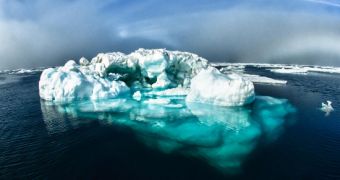A new study documents how the thawing of frozen soils in the Arctic will impact on global economy. According to this research, said phenomenon has a price tag of $60 trillion (€45.4 trillion).
Specialists explain that the thawing of the Arctic permafrost will hit global economy this hard because, when they start to warm, frozen soils release their methane content.
The methane will eventually work its way into our planet's atmosphere. Once there, it will accelerate global warming and foster many natural disasters.
“We calculate that the costs of a melting Arctic will be huge, because the region is pivotal to the functioning of Earth systems such as oceans and the climate,” the researchers write in the journal Nature.
“The release of methane from thawing permafrost beneath the East Siberian Sea, off northern Russia, alone comes with an average global price tag of $60 trillion in the absence of mitigating action. The total cost of Arctic change will be much higher,” they go on to say.
All things considered, it is likely that developing countries will be the ones hit the hardest.
Specialists predict that these regions will face extreme weather manifestations, poorer health and lower agricultural production.
Developed countries will face similar problems. The only difference is that they will be better equipped to deal with them.
Recent estimates have shown that the Arctic permafrost houses approximately 50 gigatonnes of methane.
The methane stored in these soils could be released either gradually over the next 50 years, or in one sudden burst.
The second scenario is the one human society should really be worried about, specialists say.
“Methane emerging in a sudden burst could linger for longer in the atmosphere, and trigger more rapid temperature changes than if the gas were released gradually,” they explain.
Presently, it is believed that 30% of the world's undiscovered gas reserves and 13% of all undocumented oil are hidden in the Arctic.
Therefore, oil and gas companies are looking to carry out exploration activities in these regions. They say that, if human society manages to tap into these reserves, global economy would have a lot to gain.
Greenheads, on the other hand, maintain that the costs associated with the destruction of these natural habitats far exceed any financial benefits that drilling in the Arctic might bring.

 14 DAY TRIAL //
14 DAY TRIAL //